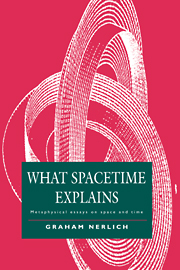Book contents
- Frontmatter
- Contents
- Preface
- Introduction
- Part One Ontology and methodology in relativity
- 1 On Learning from the mistakes of Positivists
- 2 What ontology can be about with Andrew Westwell-Roper
- 3 Special Relativity is not based on causality
- 4 Simultaneity and convention in Special Relativity
- 5 Motion and change of distance
- Part Two Variable curvature and General Relativity
- Part Three Time and causation
- Bibliography
- Index
2 - What ontology can be about with Andrew Westwell-Roper
Published online by Cambridge University Press: 19 October 2009
- Frontmatter
- Contents
- Preface
- Introduction
- Part One Ontology and methodology in relativity
- 1 On Learning from the mistakes of Positivists
- 2 What ontology can be about with Andrew Westwell-Roper
- 3 Special Relativity is not based on causality
- 4 Simultaneity and convention in Special Relativity
- 5 Motion and change of distance
- Part Two Variable curvature and General Relativity
- Part Three Time and causation
- Bibliography
- Index
Summary
At least since Quine's seminal work Word and Object, ontology has been dominated by a particular model of ontic commitment, that a theory commits itself to entities through the variables of quantification and what values those variables must take if the theory is to be true. ‘To be is to be the value of a variable.’ The predicates of a theory do not carry the load of any commitment to what is in the world itself.
The metaphysics of spacetime does not lend itself elegantly to that style of analysis of its picture of the world. Of course there is the central ontic question whether modern physics is committed to an entity, spacetime, or whether this can be reduced or ‘parsed away’ in a restructured theory. But so much of the metaphysics of spacetime concerns the various levels of structure which it has – whether it is merely a differential manifold, whether it has projective, affine or metrical structure, at what level its structure may cease to be objective and give way to merely conventional determination. This seems likely to bring us to consider some sense in which the predicates of theories rather than their quantificational structure carries some form of ontic consequence.
In this essay, jointly authored with Andrew Westwell-Roper, we explore ontology of structure rather than of quantification and the kind of consequences for methodology in metaphysics is probed.
Information
- Type
- Chapter
- Information
- What Spacetime ExplainsMetaphysical Essays on Space and Time, pp. 37 - 57Publisher: Cambridge University PressPrint publication year: 1994
